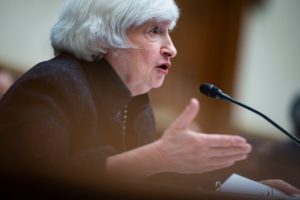By: Andrew Moran
Who knew that the terrific 2002 motion picture, Minority Report, would become the basis of a U.S. president’s economic agenda? The concept of pre-crime is nothing new in public policymaking, as it has been entrenched in counter-terrorism efforts for years. However, President Joe Biden hopes to give it an upgrade by snooping on bank accounts and confiscating money Americans have yet to earn. Is this a case of life imitating art, or just horrific and unethical economics from the current administration?
Taxing Money You Don’t Have
Conservatives and libertarians mistakenly thought it was April Fool’s Day recently when it was widely reported that the White House and Democratic lawmakers put forward a penalty on unrealized capital gains. This would be a tax on earnings you have yet to make, be it from shares in Tesla Motors or a Michelangelo Merisi da Caravaggio painting.
According to Sen. Ron Wyden (D-OR), the draft legislation would impose a levy on assets that gained in value by the end of the tax year, even if investors have yet to hit the “sell” button and generate a profit. Additional earnings would be subject to a long-term capital gains tax of up to 23.8%. Proponents aver that this wealth tax would benefit the country because it only affects individuals with $1 billion in assets or $100 million in annual income.
What about capital losses? Sen. Wyden proposed two options. The first is that the targeted taxpayers could carry the losses forward to offset future market-to-market gains. The second choice is to push them back a period in the last three years to receive refunds for taxes paid on realized gains. Accountants will most certainly be busy in the coming years, should the confiscation blitzkrieg get approved by lawmakers in the nation’s capital.
Spying On Your Transactions
Treasury Secretary Janet Yellen and her colleagues are exploring a plan that would permit the Internal Revenue Service to snoop on bank transactions over $600. The Biden administration wants financial institutions to hand over the aggregate inflow and outflow numbers each year to the tax-collecting agency for bank accounts with at least $600 worth of transactions. This, she says, would be part of broader efforts to combat tax fraud and raise approximately $460 billion in tax revenue.

Suffice it to say, to advocates of this initiative, millions of Americans are already guilty until proven innocent of tax evasion allegations. What about the sanctity of privacy? Sen. Cynthia Lummis (R-WY) might have gotten it right when she asked Yellen at a September Senate Banking, Housing, and Urban Development Committee hearing: “Do you distrust the American people so much that you need to know when they bought a couch? Or a cow?”
Yellen disagrees, telling CBS News that the government is not peeking into Americans’ pocketbooks, noting that the “proposal has been mischaracterized” because the current draft “involved no reporting of individual transactions of any individual.” However, the finance industry and trade associations do not believe it, explaining that it extends the IRS enormous control over the public’s finances. As a result of the pushback, some lawmakers want to raise the threshold to $10,000.
But if watching everyone’s financial existence at the macro level is not considered snooping, like a scene out of Alfred Hitchcock’s Rear Window, what is it then? Indeed, big brother banking is watching you.
Everyone Is Guilty Until Proven Innocent
What has made Western Civilization an unstoppable force and immovable object is the presumption of innocence, the concept that guilt must be proven. Unfortunately, as the years have gone by, this guiding principle has been nibbled away bit by bit by both sides of the political aisle. And, in the court of public opinion, it is the fundamental belief that everyone, especially any opposing ideologue, is guilty until found innocent. Or, in some cases, they are guilty no matter what. Be it terrorism or economics, the credence of this repressive philosophy can only intensify as the blunders, boondoggles, and botches force politicians and bureaucrats to double down on these asinine crusades.
Greed Is Good – For The Government
Legendary economist Thomas Sowell wrote, “I have never understood why it is greed to want to keep the money you have earned but not greed to want to take somebody else’s money.” Progressive acolytes contend that taxes are what the public pays for a civilized society, adding that the affluent need to pay their fair share to cover the cost of their wish list. By instituting a penalty on money not even made, these individuals facilitate a series of unintended consequences, whether it is ensuring capital is wasted rather than employed efficiently or ceasing innovation by forcing the likes of Elon Musk to tuck his billions under his mattress – or on a rocket to Mars.
This was originally published on Liberty Nation.
Leave a Comment